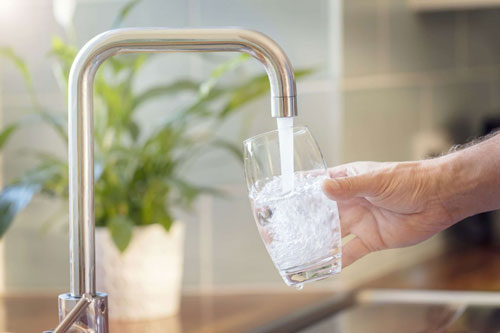In theory, water should taste the same no matter where you get it. In reality, that is not true. Water from a water fountain tastes different than water at a restaurant, which tastes different from a bottle bought at a convenience store. The taste of water varies depending on many factors, including the person drinking it, the water’s source, and even the pipes that deliver it to your sink. Let’s look deeper at some of the reasons the taste of water differs.
How Can Sources Affect the Taste of Water?
The way water tastes usually depends on where it comes from. For example, if you live in an urban or suburban area, the water you drink likely comes from a tap. This water typically contains fluoride to protect your teeth, but it can alter the taste. Also, copper pipes in your home might change how the water tastes.
In more remote areas or mountainous parts of the country, the water you drink at home may come from a spring or a well. Springwater often contains minerals that it collected when running down a mountain or across the soil. Well water can have a similar taste. Because the water is sourced from underground, it can have a unique taste even if it is filtered.
Alkaline water has ionized minerals that alter its taste due to the higher pH level. Some believe that alkaline water has a smoother taste and health benefits, although these claims have never been proven in an extensive scientific study. Finally, there is distilled water. This water comes from the steam of boiled water and does not have any minerals, chemicals or bacteria that alter its taste.
When Should I Be Concerned About the Taste of My Water?
Usually, the taste of water should not be a reason for concern. The differences you taste can come from small changes in naturally-occurring minerals that will not harm you. However, there are times when the taste of water is a red flag to stop drinking and investigate the source of the problem.
For example, certain bacteria have a strong sulfur smell and a salty taste. The water may also appear to be off-color as well. These are both signs that bacteria has grown in your drains and pipes. Earthy odors or tastes indicate a more serious underlying problem. These come from dissolved solids or a decaying animal in the public water source, which bring dangerous bacteria that spread disease and can make you very sick.
Metallic smells may indicate the presence of elements like lead, arsenic, mercury or copper. These elements come from decaying pipes and may be a sign that you need to replace or inspect your pipes. Other plumbing materials, like washers and hoses, can also decay and alter water taste.
Finally, outside chemicals such as gasoline and paint. These tastes come from spills near a plastic pipe and the water may smell like oil, rubber or turpentine. While dangerous, these events do not last long and can be filtered out quickly. If these tastes persist it means a large spill or a leak.

Have Your Water Checked at the Atlantic Blue Water Center
You won’t notice small shifts in how water tastes. When the taste changes dramatically it is a sign that chemicals, metals or other substances entered your system. These changes can be dangerous and should be investigated. Knowing what is in your water will help to quickly find the cause. It is also a good best practice to have your water checked at an outside laboratory even if it tastes fine. A lab like the one at the Atlantic Blue Water Center offers water testing that can rapidly detect the presence dangerous impurities or chemicals.
Traditional water filters in hand-held pitchers, attached to your sink or on your refrigerator may not be strong enough to remedy all issues with the quality of your water. Commercial filters provide a layer of protection, but they are also not fully comprehensive and lure you into a false sense of security. Professional water testing can determine what substances are in your water and if you should be concerned. Don’t wait until the taste of water in your home is wrong. Check it first to make sure you can drink safely and have peace of mind. While some impurities may simply bring an upset stomach, some can be fatal.
Improve the Taste of Water at Your Home Using Atlantic Blue Water Center
We provide water treatment solutions for homeowners that want a cleaner water supply. We’re also focused on providing additional education on water treatment, water quality and issues associated with water contaminants. Call us at (410) 751-9200 to schedule your in-home water testing appointment today.
